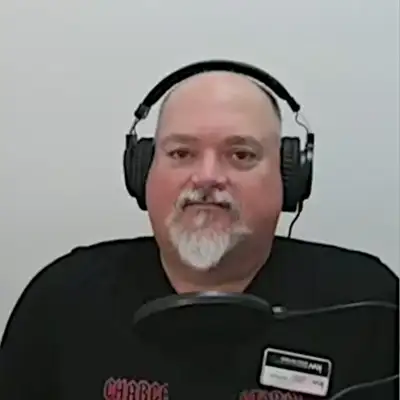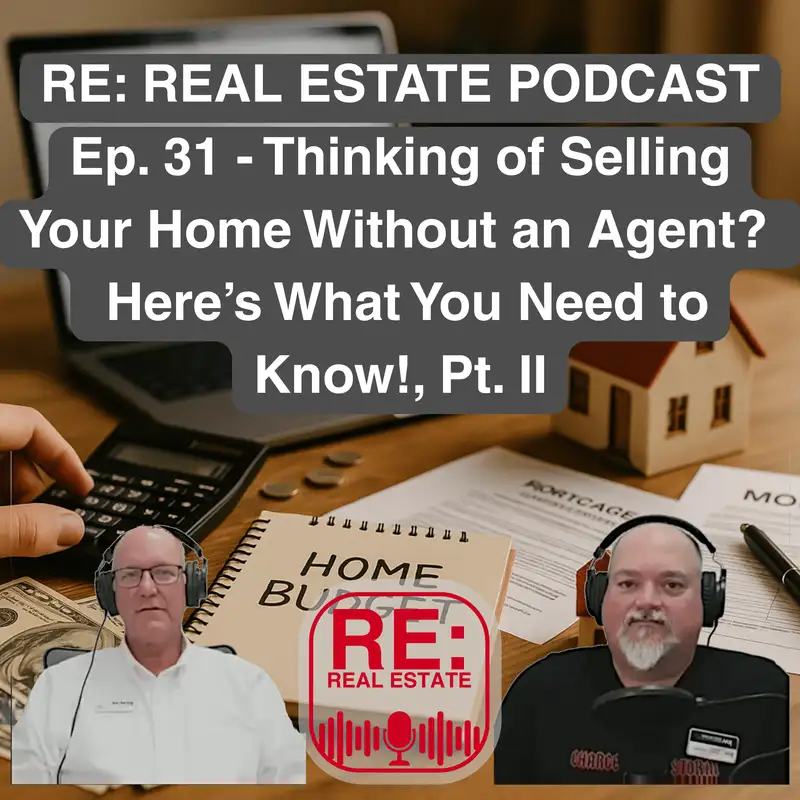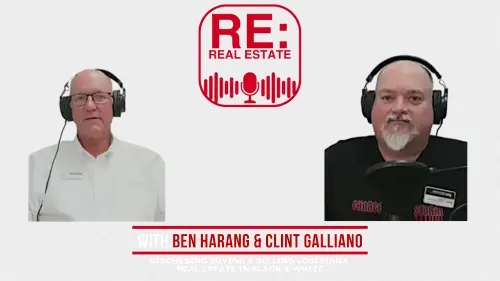Ep. 31 - Thinking of Buying a Home? - Let’s Talk Money Strategy, Pt. II
Clint C. Galliano, REALTOR® (00:14)
to the RE Real Estate Podcast. I'm Clint Galliano your host. Ben Harang was out on vacation. He's back now. I recorded the second part of...
Thinking of Buying a Home, Let's Talk Money Strategy. while he was out on vacation in Europe, but we had some technical difficulties with the recording, so this is the second attempt at that. All right, so if you caught part one, you already know that we covered some of the big questions. How to shift your thinking, how lenders size you up when they're evaluating you for a loan.
and how to start building a real financial foundation for building a home or for buying a home. Today we're going to get into the traps that some people fall into, the timing of it all, and what it looks like when you actually pull the trigger to move forward with purchasing a home.
And spoiler alert, talking to a real estate agent even early can help you avoid most of the headaches that we're going to cover.
All right, first we're gonna talk about what not to do.
So stuff that can quietly derail your home buying process before you even tour a house. And these are some standard things and we warn people about this even after they're under contract. But before you start looking at homes, you want to keep your credit in good shape. So don't open new credit accounts. So don't get...
new store cards, you know, don't go to Hot Topic or Buckle and open a credit card, don't get a travel points card, or buy a house full of furniture before you even put in an offer on a house. Those will affect your credit score, especially if your credit is marginal. If your credit is in really good shape, then those won't affect your credit score as much.
and it's not as bad. But all of those things, every time any type of financing checks your credit score, or checks your credit, it dings your credit score. Those eventually recover, but it may take a while. And again, like I said, if you're marginal on your credit score, on qualifying for the loan, those will impact your ability to qualify for a loan.
Another thing that we run into is don't make large unexplained bank deposits. It's like if you've got cash savings, you know, in a coffee can or stuffed under your mattress, don't go deposit it into your bank account without some type of paper trail documenting where it came from. If you're getting money from a relative,
then that can be explained with a gift letter. Basically, the relative is testifying that they're giving you this money as a gift to help with your home purchase. But I had one situation where a listing I had, a buyer came along that wanted to buy the home and he made a deposit in his bank account of cash that he had laying around.
to cover his down payment and he had no record to document where the money came from and that just basically canceled his financing until he could get that all straightened out. And I don't know what happened to him because I'm sure by the time, well, actually the house was no longer available. So never heard from the guy again. Don't co-sign for somebody.
because that puts that credit liability on your credit report. And then the other thing is don't make assumptions about loan limits or requirements without talking to a lender. Go talk to a lender to know what applies to you and your situation. All right. Next, we're going to talk about timing your move.
So let's say you're six months to a year out. What should you be doing between now and then? six to 12 months, talk to a lender and agent for, and a real estate agent for a quick strategy session. Start your savings discipline. So remember we talked about the three buckets on the previous episode where we talked about this topic.
and work on your credit profile. Small improvements make a big difference. So that's paying down any debt that you owe, continuing to pay on any revolving credit or loans that you do have already. Those make a really good difference. Three to six months out, get pre-approved, not pre-qualified, but pre-approved. That's where the lender is.
Verifying the financial information that you supply them with so that they know that it's factual and not just you telling them numbers. Narrow down your ideal areas and price ranges with your agent so that you know what you're looking for.
Under three months, no big financial moves, know, kind of the same thing that we've been doing all along. Start watching listings and learning what your money can get you. Look at what the market's doing. So if homes that you like in an area that you like are staying roughly the same, look at how long the listings are staying on the market. That gives you a better idea of what you're going after.
and how far those prices are. In our market right now, we are at the end of June 2025 in Terrebonne Parish. There's a lot more inventory. Still the same amount of buyers. That seems to be the case across the board, but we've got a lot more inventory coming online.
So that means there's more choice for the buyers. So in some cases, unless it's the perfect home and there's nothing wrong with it, then homes are taking a little longer to sell. you know, those are opportunities for buyers. Get ready to act quickly because if you, like I alluded to just now,
If you find the perfect home, you want to move on it quickly because if you don't, somebody else will. Mini takeaway things I've seen too often is people wait until 30 days before their lease ends and then they're scrambling to try and get into a home and they panic buy something that is not the basically that they're not ready for.
To be honest, 30 days out is really cutting it a little too short because we wind up, typically we take at minimum 35 to 45 days to close on a property after we get it under contract. In some instances we can close sooner, but that's going to be your typical lead time from getting it under contract. That's not taking into account.
the search to find the property that fits your situation.
All right, so here's a truth, all right? I'm not gonna use truth bomb because I think that's cheesy. Buying a house isn't just a financial process, it's a negotiation. And you don't want to step into a negotiation without a guide.
So an agent will help you sooner than later, or should say why you should start working with an agent sooner than later. They'll help you budget out the real cost of buying a house. So it's not just a down payment. You've got inspections, insurance, escrow moving. A situation we ran across yesterday. Clients have been looking for a house. They've got
a certain budget they're trying to stay in. find a house that was the list price was well within their budget. But what I like to do when I'm working with buyers is I go ahead and plot out the other expenses involved with buying a home. In this case, the home also required almost $8,000 a year in insurance between homeowners and flood.
And with that, for her to get to closing, we were looking at her having to, on top of the almost $5,000 in down payment, needing to come up with about $7,500 in closing costs on her own.
And that would be if the seller would be willing to cover another $7,500 to $8,000, no $7,500, so she'd have to come up with about $8,000 in closing costs out of pocket because the max that the seller could cover would be about $7,500. So that wound up being a negative on her offering on that property.
She, if she would not have been working with me and my team, she would have made an offer on the property and then had to drop out because she would not have realized that ultimately it would have cost her that much and that she would have had to pay that much going into it. So we were able to keep her from getting into a contract and then.
finding out after, you know, making that commitment that, hey, I can't afford this and having to back out. So now we're looking at other properties and seeing what we can make work. So this is why I always tell people don't wait till you find a house that's too late. By then you're rushing, you're trying to hurry up and get things done. Talk to an agent and at that point you're planning, you're not reacting.
All right, some smart buyer habits that pay off. Buyers that come out of the process in good shape usually have these habits in common. Track your spending like a CFO. And these are some habits that are encouraged for you to emulate as a buyer. Even if you just loosely track your spending, you want to keep track of it so that you understand where your money is going, your current income.
That way, if you know where it's going, you can adjust your spending to if you need to build up more savings to allow you to cover things more, especially if you find the house that you NEED to have. It allows you to adjust course along the way and get that house.
Save with purpose. All right, we talked about the savings buckets. Save for your down payment, save for your closing costs, and save for your reserves or your cushion fund. This gives you the most amount of options. If you've got money saved up in all three of those buckets, then you're golden for getting what you want. That allows you to go into the negotiation in the strongest position and
Ultimately, it's kind of like a balancing act between closing costs and offer price in terms. And so if you've got the ability to cover closing costs and you've got extra cash, then you can get the best price in terms, especially in this market. Ask questions early.
Ask if you're a ask if you're an agent, even your accountant if you're using one. That way you, you know, I always say there's no stupid questions. People feel questions are stupid, but they're not because they come from not knowing. So I don't consider any questions stupid. Because if you've got a question about it, that means that you don't understand something. And I am more than happy to.
help you understand better so you can make the best decision for your situation.
And the other thing to that habit that's encouraged is to be flexible. So markets change. You may need to adjust your plan. Well, as in the case last night, you know, client was looking at this certain property and it made it really tough. Especially with her not having enough funds on hand to go after that property.
So she's adjusting and pivoting and looking at a slightly different area and preferably something with better insurance and doesn't require flood insurance. So that'll put her in a better position.
All right, so moving on, we're going to talk about what happens when you are ready. So eventually it clicks. You've got your finances in order, your credit looks great, and your agent and lenders are in the loop. So what happens next?
You get an updated pre-approval. And typically, depending on what lenders you're working with, those can be updated within an hour. It's just a matter of a text message or a phone call. Or in the case of some lenders, they're able to allow the agent to update the pre-approval online whenever they need to. Start house hunting with your agent.
target homes that align with your monthly comfort zone. So basically that fit your budget. And again, taking into account that it's not just going to be your note, but also your escrow amounts. So that would be taxes and insurance, HOA fees, the like.
then you make an offer with your agent negotiating the price terms and possibly credits towards closing costs if needed or desired. And again, it depends on the situation in the market, how long the property's been on the market, those types of things. Once it's inspected, you'll get inspections done.
then the lender will order the appraisal. Underwriting will be looking over everything, including documents that they request of you, judging to make sure that, I say judging, basically evaluating to make sure that you can support the loan financially and have all of your ducks in a row depending on the loan type. And then they give final approval.
which we call clear to close.
And then at that point, they'll send a, they'll work with the title company to send a closing disclosure, which you want to get reviewed with your agent to make sure that everything's correct on it because nobody's perfect. So sometimes there are some issues with that, but just to make sure the right numbers are on there. And that tells you how much money, if any, you need to bring to closing.
And then you show up at closing day and sign paperwork, get your keys and in case he didn't recognize that, that was a big sigh of relief.
Alright, so there's a myth that buying a house has to be overwhelming. Truth is, is that if you prep early and get the right people around you, it can be smooth event. It's not stress free, but it's really smooth sailing when you have the right team around you. So some final thoughts. Take away from both parts of this series is that if you don't have to be ready to buy,
to start asking good questions. The sooner you understand your finances, your timeline, and your options, less stressful the actual process becomes. So encourage actions are to pull your credit. You can go to...
annualcreditreport.com.
So this is a government website, annualcreditreport.com. You can get a free credit report and you can get it from any one of the big three, Equifax, Experian, or TransUnion. If I understand correctly, you can pull your reports on a weekly basis at no cost to you.
and you get a free full credit report from each of the big three companies.
So, that, if I understand correctly, that'll be with a score. The pulling once a week, I believe that that will give you what's on your report, not necessarily a credit score, but once a year, the big three credit reporting companies are required to give you a free copy of your credit score.
All right, next is to set up your home savings account. So that way you're putting your money aside and like we discussed, you know, set up three separate accounts for closing costs, down payment and reserves.
Next would be book a quick call with a lender and or your local real estate agent who can refer you to a lender if you don't already have one.
That way you can kind of plan out your steps and know what your next steps forward are that'll give you the best chance of success.
And that's pretty much it. We're going to include a free worksheet in the show notes. That's it's called, am I financially ready to buy? And you feel free to download it. You can check it out. It kind of gives you the steps of what to do, how to do it. And basically get yourself ready to buy. So if you've enjoyed this.
We'd love a like, a comment, share, let your friends know.
Let them know about rerealestatepodcast.com. They can access individual episodes on the website. They can subscribe with any podcast app. They can also access our YouTube channel from there and watch the videos. You can also find us on Spotify. So that's all the good stuff. Also, if you've got any questions.
can go to rerealestatepodcast.com and click on ask a question and fill out the form to ask your question and we'll address it here on the podcast. So I think that's about it. Like, share, subscribe, get all your friends watching us or listening to us. All right. Appreciate it. Thank you all. And we'll talk to you soon. Bye bye.
Creators and Guests


